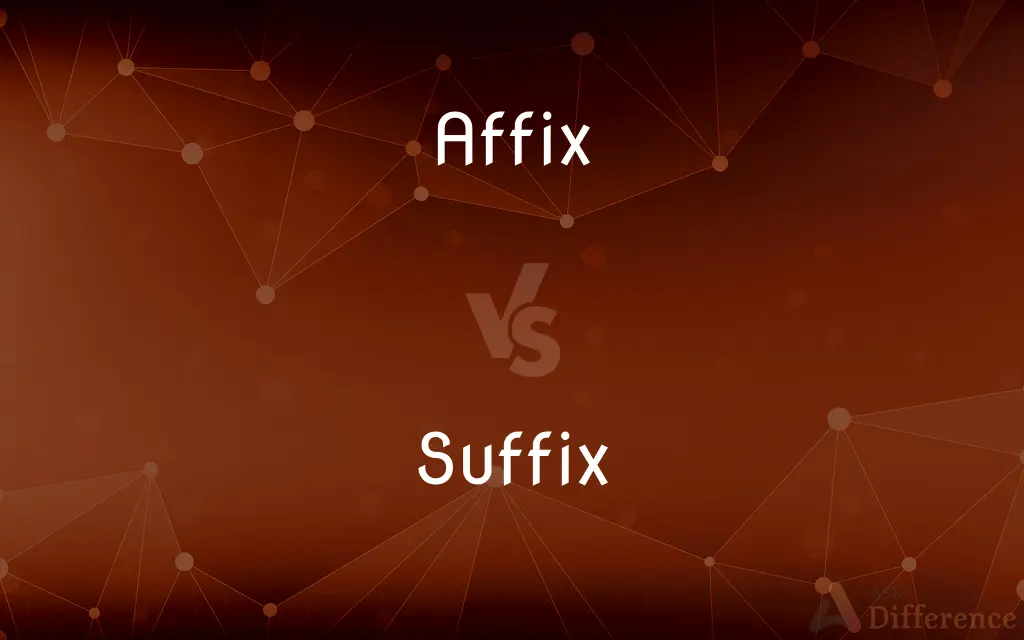Affix vs. Suffix — What's the Difference?
By Tayyaba Rehman & Urooj Arif — Updated on March 24, 2024
An affix is a morpheme attached to a word stem to modify its meaning or create a new word, whereas a suffix is a type of affix that specifically comes at the end of a word stem.

Difference Between Affix and Suffix
Table of Contents
ADVERTISEMENT
Key Differences
Affixes are morphological elements attached to a word stem or root to alter its meaning or form a new word. They are a broad category that includes prefixes (added to the beginning of a word), infixes (inserted within a word), and suffixes (appended to the end of a word). Whereas, suffixes are a subset of affixes that specifically modify the meaning of a word, its grammatical function, or form a new word by being added strictly to the end of a word stem.
An affix can change the grammatical category of a word, such as from a noun to an adjective, or from an adjective to an adverb, reflecting different aspects of language including tense, mood, person, number, and gender. On the other hand, a suffix, while also capable of altering grammatical category, primarily focuses on adding to the end of a word to indicate these changes.
While all suffixes are affixes, not all affixes are suffixes. For example, prefixes like "un-" in "unhappy" or "pre-" in "predefine" are affixes but not suffixes. In contrast, "-ness" in "happiness" or "-ly" in "quickly" are examples of suffixes, showcasing their role as a specific type of affix.
The application of an affix to a word stem can create entirely new words or significantly change the meaning of the original word. Suffixes, as a form of affix, specifically engage in this process by being attached to the end of words, often altering the word class or adding to its meaning in a way that is predictable based on the suffix used.
Understanding the distinction between affixes and suffixes is crucial in the study of linguistics, especially in morphology, the study of word formation. It enables a clearer analysis of how words in languages evolve and how their meanings or grammatical functions are modified.
ADVERTISEMENT
Comparison Chart
Definition
A morphological element added to a word stem to modify its meaning or create a new word.
A type of affix that comes at the end of a word to alter its meaning or grammatical function.
Types
Prefixes, infixes, and suffixes.
Only appears at the end of words.
Function
Can change meaning, grammatical function, or create new words.
Specifically modifies or indicates grammatical category, tense, mood, etc.
Examples
"Un-" in "unfair", "-ly" in "quickly", "-ness" in "happiness".
"-ness" in "happiness", "-ly" in "quickly".
Usage
Broad category encompassing all types of word modifications.
Specific to modifications at the end of words.
Compare with Definitions
Affix
Changes word meanings.
Adding the affix -ful to hope creates hopeful.
Suffix
Indicates grammatical changes.
-ed in walked shows past tense.
Affix
Broad application in linguistics.
Studying affixes reveals patterns in language evolution.
Suffix
Can form new words.
Adding -tion to operate forms the noun operation.
Affix
General term for word modifiers.
The affix re- in redo means to do again.
Suffix
Often changes word class.
-ly changes the adjective quick to the adverb quickly.
Affix
Includes various types.
The prefix anti- is an affix meaning against.
Suffix
Always at the end of words.
The suffix -able in readable means capable of being read.
Affix
Can alter grammatical function.
The affix -er changes run to runner, a noun.
Suffix
Specific type of affix.
The study of suffixes helps in understanding word formations.
Affix
In linguistics, an affix is a morpheme that is attached to a word stem to form a new word or word form. Affixes may be derivational, like English -ness and pre-, or inflectional, like English plural -s and past tense -ed.
Suffix
In linguistics, a suffix is an affix which is placed after the stem of a word. Common examples are case endings, which indicate the grammatical case of nouns, adjectives, and verb endings, which form the conjugation of verbs.
Affix
Stick, attach, or fasten (something) to something else
Panels to which he affixes copies of fine old prints
Suffix
An affix added to the end of a word or stem, serving to form a new word or functioning as an inflectional ending, such as -ness in gentleness, -ing in walking, or -s in sits.
Affix
An addition to the base form or stem of a word in order to modify its meaning or create a new word.
Suffix
To add as a suffix.
Affix
To secure to something; attach
Affix a label to a package.
Suffix
A morpheme added at the end of a word to modify the word's meaning.
The suffix "-able" changes "sing" into "singable".
Affix
To impute; attribute
Affix blame to him.
Suffix
(mathematics) A subscript.
Affix
To place at the end; append
Affix a postscript to a letter.
Suffix
(computing) A final segment of a string of characters.
The string "abra" is both a prefix and a suffix of the string "abracadabra".
Affix
(Linguistics) To add as an affix.
Suffix
(transitive) To append (something) to the end of something else.
Affix
Something that is attached, joined, or added; an appendage or addition.
Suffix
A letter, letters, syllable, or syllables added or appended to the end of a word or a root to modify the meaning; a postfix.
Affix
(Linguistics) A word element, such as a prefix or suffix, that can only occur attached to a base, stem, or root.
Suffix
To add or annex to the end, as a letter or syllable to a word; to append.
Affix
That which is affixed; an appendage.
Suffix
An affix that is added at the end of the word
Affix
(linguistic morphology) A bound morpheme added to the word’s stem's end.
Suffix
Attach a suffix to;
Suffix words
Affix
A bound morpheme added to a word’s stem; a prefix, suffix, etc.
Affix
(mathematics) The complex number associated with the point in the Gauss plane with coordinates .
Affix
(decorative art) Any small feature, as a figure, a flower, or the like, added for ornament to a vessel or other utensil, to an architectural feature.
Affix
(transitive) To attach.
To affix a stigma to a person
To affix ridicule or blame to somebody
Affix
(transitive) To subjoin, annex, or add at the close or end; to append to.
To affix a syllable to a word
To affix a seal to an instrument
To affix one's name to a writing
Affix
(transitive) To fix or fasten figuratively; with on or upon.
Eyes affixed upon the ground
Affix
To subjoin, annex, or add at the close or end; to append to; to fix to any part of; as, to affix a syllable to a word; to affix a seal to an instrument; to affix one's name to a writing.
Affix
To fix or fasten in any way; to attach physically.
Should they [caterpillars] affix them to the leaves of a plant improper for their food.
Affix
To attach, unite, or connect with; as, names affixed to ideas, or ideas affixed to things; to affix a stigma to a person; to affix ridicule or blame to any one.
Affix
To fix or fasten figuratively; - with on or upon; as, eyes affixed upon the ground.
Affix
That which is affixed; an appendage; esp. one or more letters or syllables added at the end of a word; a suffix; a postfix.
Affix
A linguistic element added to a word to produce an inflected or derived form
Affix
Attach to;
Affix the seal here
Affix
Add to the very end;
He appended a glossary to his novel where he used an invented language
Affix
Attach or become attached to a stem word;
Grammatical morphemes afix to the stem
Common Curiosities
What distinguishes an affix from a suffix?
An affix is a broader term that includes any morpheme attached to a word stem, while a suffix is specifically an affix that attaches to the end of a word.
Can the application of a suffix change the meaning of a word?
Yes, suffixes can significantly change the meaning of a word or its grammatical function.
How can recognizing suffixes benefit language learners?
Recognizing suffixes can help learners understand word meanings, grammatical functions, and word formation, aiding vocabulary expansion and reading comprehension.
Are suffixes used in all languages?
While not all languages use suffixes in the same way, many languages utilize suffixes as part of their morphological system to indicate grammatical categories and relationships.
Can affixes be removed from a word?
In analysis or linguistic study, affixes can be removed to identify the root word, but in practical use, they are integral to the words they form.
Can a word have more than one affix?
Yes, words can have multiple affixes, including both prefixes and suffixes, to modify their meaning or function in complex ways.
Do affixes affect spelling rules?
Yes, the addition of affixes can sometimes trigger spelling changes in the root word or require adherence to specific spelling rules.
How do suffixes affect word pronunciation?
Suffixes can influence the stress and pronunciation of words, sometimes leading to significant changes in the spoken form.
Are infixes common in English?
Infixes are rare in English but are found in some languages as morphemes inserted within a word to alter its meaning or grammatical function.
Is a suffix always a single letter?
No, suffixes can be several letters long; their length varies depending on the function and the word they modify.
Why are affixes important in linguistics?
Affixes are crucial for understanding word formation, grammatical structures, and the evolution of language.
What is the process of adding an affix to a word called?
The process is known as affixation, a key part of morphological analysis in linguistics.
How do suffixes influence word class?
Suffixes can change the class of a word, such as turning an adjective into an adverb.
Can suffixes form new words?
Yes, suffixes can transform words into new forms or create entirely new words by changing their grammatical category or meaning.
How do prefixes differ from suffixes?
Prefixes are affixes placed at the beginning of a word to modify its meaning, unlike suffixes, which are placed at the end.
Share Your Discovery

Previous Comparison
Comprehension vs. Analysis
Next Comparison
Pawl vs. RatchetAuthor Spotlight
Written by
Tayyaba RehmanTayyaba Rehman is a distinguished writer, currently serving as a primary contributor to askdifference.com. As a researcher in semantics and etymology, Tayyaba's passion for the complexity of languages and their distinctions has found a perfect home on the platform. Tayyaba delves into the intricacies of language, distinguishing between commonly confused words and phrases, thereby providing clarity for readers worldwide.
Co-written by
Urooj ArifUrooj is a skilled content writer at Ask Difference, known for her exceptional ability to simplify complex topics into engaging and informative content. With a passion for research and a flair for clear, concise writing, she consistently delivers articles that resonate with our diverse audience.
















































